
Modeling systems
William T. Powers (2009) We hear quite a lot about models such as weather models which can be used to predict what will happen in the next few days, or models of colliding galaxies which […]

William T. Powers (2009) We hear quite a lot about models such as weather models which can be used to predict what will happen in the next few days, or models of colliding galaxies which […]

William T. Powers (2011) In PCT, we say that organisms learn control, not behavior. But the meaning of that isn’t self-evident — isn’t controlling also behaving? The organization of a control system, in most cases, […]

William T. Powers (2010)

Timothy A. Carey Routledge; 1st edition (December 1, 2017) Book description Inappropriate health care is an escalating and expensive problem. It affects high income, middle income, and low income countries and wastes billions of dollars […]

Timothy A. Carey, Sara J. Tai, and Robert Griffiths Palgrave Macmillan; 1st ed. 2021 edition (April 5, 2021) Book Description This book offers a radically different perspective on the topic of health inequity. Carey, Tai, […]
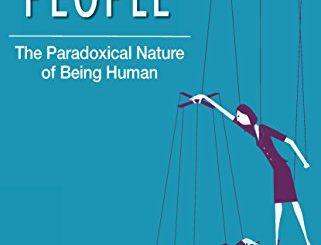
Richard S. Marken, and Timothy A. Carey Australian Academic Press (February 3, 2016) Book description “We need to strive for a world where people control what is important to themselves while minimizing the controlling of […]

Timothy A. Carey New View Pubns (January 1, 2008) Book description Believing that people with psychological problems get themselves better, Australian clinical psychologist, academic and researcher Timothy A. Carey introduces readers to the Method of […]
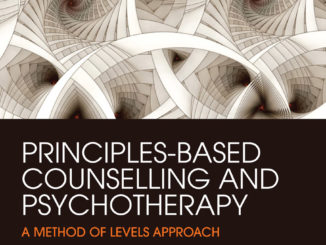
Timothy A. Carey, Warren Mansell, and Sara J. Tai 2015, Routledge. ISBN 9780415738781 Book Description Many current approaches to the treatment of psychological problems focus on specific disorders and techniques that are purported to be […]
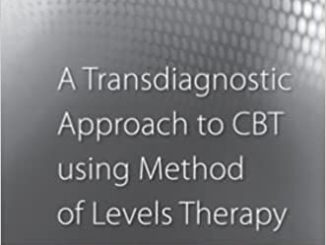
Warren Mansell, Timothy A. Carey, and Sara J. Tai Routledge; 1st edition (November 27, 2012) Book description Cognitive Behavioural Therapy (CBT) is the treatment of choice for most mental health problems. Each different problem is […]
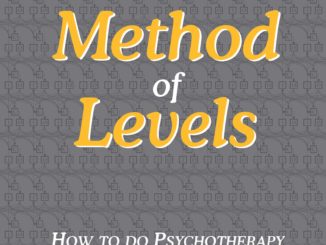
Timothy A. Carey “I’ve just finished the Method of Levels, and I’m astonished, delighted, and inspired. I was a psychotherapist for many years, using a variety of approaches (predominantly Gestalt Therapy, several versions of family […]
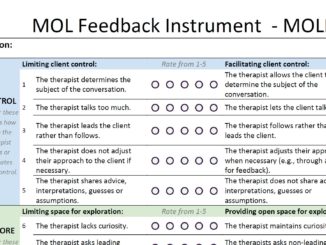
Using the MOLFI With the help and suggestions of MOL trainers, students, practitioners and PCT experts we have developed an instrument that is now ready to use: the MOLFI (Method of Levels Feedback Instrument). The […]
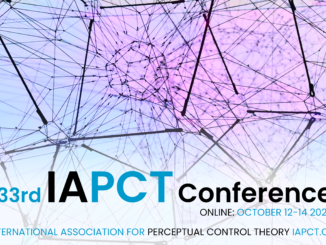
12-14th of October 2023, we’ll have our 33rd annual IAPCT conference, online. […]
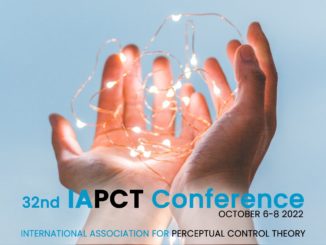
Information for subscribed participants Dear participant, We are happy that you registered to participate in our 32st IAPCT annual conference on October 6-8, 2022. We look forward to sharing with you the many facets of […]

Online conference from Thursday 6th to Saturday 8th of October 2022 ONLINE REGISTRATION: You can register for free by filling in this form: Loading…

Martin Taylor’s ongoing book project describing the foundations of perceptual control theory and its many implications. […]

List of sources (on iapct.org and externally) demonstrating various aspects of perceptual control. Some demos (Java) work well in your browser, while others need to be installed.
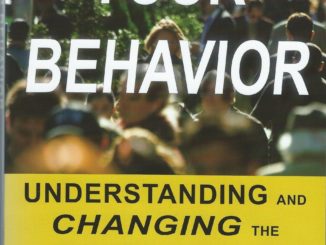
“Wow. I am impressed with this book! It is comprehensive, neatly structured, and provides a great scientific context for introducing Perceptual Control Theory to the layperson. The explanation builds up gradually over the chapters. Fantastic.” – Warren Mansell, DPhil, DClinPsy, CPsychol […]

Perceptual Control Theory (PCT) has been around for over 50 years, leaving a trail of papers, books, websites, posts, conversations, videos all over the web. This is a quick guide to get started with the most basic materials: introductory texts, books, demonstrations, papers, websites and finding others interested in PCT. Welcome! […]
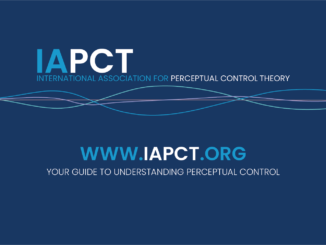
We proudly present to you our new IAPCT website. This site is build in wordpress by Eva de Hullu and Matias Salgado. The purpose of the site is to provide a web portal for knowledge […]
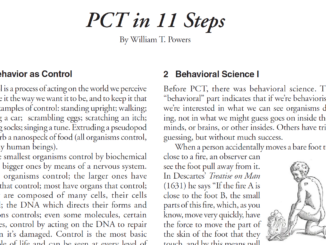
An outline of PCT written as a proposal for a series of TV programs […]
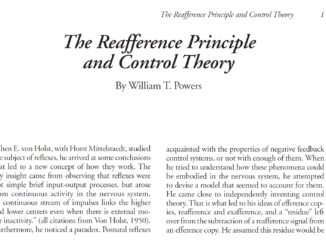
William T. Powers …small changes convert von Holst’s model into a true negative feedback control system. lf we assume with von Holst that a similar architecture holds at higher levels in the nervous system, we […]
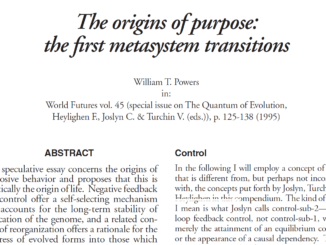
A proposal that the the emergence of negative feedback control and the emergence of life are the same thing. A picture emerges in which the basic principle of control runs like a unifying thread from the first living molecules to modern complex organisms. […]
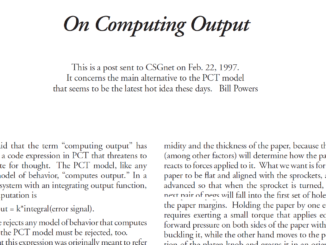
Notes on the notion that the brain plans our movements and issues commands to muscles, pre-computing the precise muscle movements for people or robots. […]
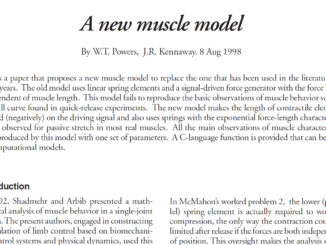
If you are going to reverse engineer and then simulate living organisms and how they move about, it is important to simulate all the physics correctly, such as the ray tracing included in the Little Man. Here is a paper that offers significant improvements regarding simulating the actions of muscles. […]
Copyright © 2022 iapct.org